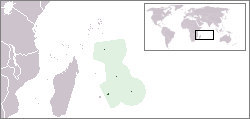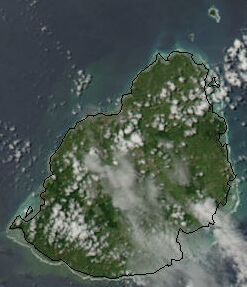Difference between revisions of "Mauritius" - New World Encyclopedia
John Willis (talk | contribs) (imported lost image coding & other editing) |
John Willis (talk | contribs) (sidebar work) |
||
| Line 9: | Line 9: | ||
| align="center" width="140px" rowspan="2" height="110px" | [[Image:Mauritius_coa.png|125px]] | | align="center" width="140px" rowspan="2" height="110px" | [[Image:Mauritius_coa.png|125px]] | ||
|- | |- | ||
| − | | align="center" width="140px" | | + | | align="center" width="140px" | Flag of Mauritius |
| + | |- | ||
|} | |} | ||
|- | |- | ||
| − | | align=center style="vertical-align: top;" colspan=2 | <small> | + | | align=center style="vertical-align: top;" colspan=2 | <small> National motto (Latin): ''Stella Clavisque Maris Indici''<br>English: ''Star and Key of the Indian Ocean'' |
|- | |- | ||
| align=center colspan=2 style="background: #ffffff;" | [[image:LocationMauritius.png]] | | align=center colspan=2 style="background: #ffffff;" | [[image:LocationMauritius.png]] | ||
|- | |- | ||
| − | | ''' | + | | '''Official language''' |
| − | | | + | | English |
|- | |- | ||
| − | | ''' | + | | '''Capital''' |
| − | | | + | | Port Louis |
|- | |- | ||
| − | | ''' | + | | '''President''' |
| − | | Sir | + | | Sir Anerood Jugnauth |
|- | |- | ||
| − | | ''' | + | | '''Prime Minister''' |
| − | | | + | | Navinchandra Ramgoolam |
|- | |- | ||
| − | | ''' | + | | '''Area'''<br> - Total <br> - % water |
| − | | [[ | + | | [[Ranked 168th]] <br> 1,860 km² <br> 0.05% |
|- | |- | ||
| − | | ''' | + | | '''Population'''<br> - Total (2002)<br> - Density |
| − | | [[ | + | | [[Ranked 149th]]<br> 1,189,825<br> 588/km² |
|- | |- | ||
| '''Independence''' | | '''Independence''' | ||
Revision as of 11:16, 10 December 2005
| ||||
| National motto (Latin): Stella Clavisque Maris Indici English: Star and Key of the Indian Ocean | ||||

| ||||
| Official language | English | |||
| Capital | Port Louis | |||
| President | Sir Anerood Jugnauth | |||
| Prime Minister | Navinchandra Ramgoolam | |||
| Area - Total - % water |
Ranked 168th 1,860 km² 0.05% | |||
| Population - Total (2002) - Density |
Ranked 149th 1,189,825 588/km² | |||
| Independence | 1968 | |||
| Currency | Mauritian Rupee | |||
| Time zone | Universal Time +4 | |||
| National anthem | Motherland | |||
| Internet TLD | .mu | |||
| Country Calling Code | 230 | |||
The Republic of Mauritius is an island nation in the southwest Indian Ocean, about 900 km east of Madagascar. In addition to the island of Mauritius, the republic includes the islands of St. Brandon and Rodrigues and the Agalega Islands. Mauritius is part of the Mascarene Islands, with the French island of Réunion 200 km to the southwest.
History
The island was discovered by the Portuguese in 1505, and was uninhabited until colonisation by the Dutch in 1638, who named the island in honour of Prince Maurice of Nassau. The French controlled the island during the 18th century and renamed it Ile de France. The island was taken over by the British in 1810 and reverted to its former name.
Independence was attained in 1968, with the country becoming a republic within the British Commonwealth in 1992. Mauritius has been a stable democracy with regular free elections and a positive human rights record, and has attracted considerable foreign investment earning one of Africa's highest per capita incomes.
Politics
The head of state of Mauritius is the president, who is elected for a five-year term by the National Assembly, the unicameral Mauritian parliament. The National Assembly consists of 62 members elected directly by popular vote, with between 4 and 8 further members appointed from "best losers" election candidates to represent ethnic minorities, depending on the results of the election. The government is headed by the prime minister and a council of ministers.
Historically, elections have always adhered to a two-party system in Mauritius and this has also been the case this time, with the outgoing MSM/MMM/PMSD coalition against the PTr-led Alliance Sociale which includes PMXD, Les Verts, MR, MSD and MMSM.
The Alliance Sociale coalition won 38 seats and will form the next government with PTr leader Navinchandra Ramgoolam as Prime Minister. The MSM/MMM/PMSD coalition won 22 seats and will form the opposition. The 2 remaining seats for Rodrigues were won by OPR candidates. According to the Constitution, an additional eight seats were allocated to "best losers" to guarantee equitable representation of all ethnic groups. This brought the total representation to 42 Alliance Sociale, 24 MSM/MMM/PMSD, and 4 OPR.
Dependencies
Rodrigues, which used to be Mauritius's 10th district is now autonomous.
The latter, together with Agalega and Cargados Carajos Shoals (aka Saint Brandon Rocks) are dependencies of Mauritius.
Note: Mauritius also claims the French-owned Tromelin Island and the Chagos Archipelago (British Indian Ocean Territory).
A number of shallow banks also belong to Mauritius, such as:
- Soudan Banks (including East Soudan Bank)
- Nazareth Bank
Note: Mauritius also claims the Saya de Malha Bank as part of its exclusive economic zone as it falls into Mauritian Territorial Waters.
Geography
Together with Réunion and Rodrigues, Mauritius is part of the Mascarene Islands. This archipelago was formed in a series of undersea volcanic eruptions, as the African plate drifted over the Réunion hotspot. Mauritius and Rodrigues were formed 8-10 million years ago. They are no longer volcanically active, and the hotspot now rests under Réunion. The island of Mauritius itself is formed around a central plateau, with its highest peak in the southwest, Piton de la Riviere Noire at 828 m. Around the plateau, the original crater can still be distinguished from several mountains.
The local climate is tropical, modified by southeast trade winds; there is a warm, dry winter from May to November and a hot, wet, and humid summer from November to May. Cyclones affect the country during November-April.
The island's capital and largest city is [[Port Louis], in the northwest.
The island is well known for its exceptional natural beauty; "First God made Mauritius, then he copied it and made Paradise" and "God modeled heaven on Mauritius" are quotes attributed variously to Rudyard Kipling and Mark Twain.
Economy
Since independence in 1968, Mauritius has developed from a low-income, agriculturally based economy to a middle-income diversified economy with growing industrial, financial, and tourist sectors. For most of the period, annual growth has been of the order of 5%-6%. This remarkable achievement has been reflected in increased life expectancy, lowered infant mortality and a much improved infrastructure.
Sugar cane is grown on about 90% of the cultivated land area and accounts for 25% of export earnings. However, a record-setting drought severely damaged the sugar crop in 1999. The government's development strategy centres on foreign investment. Mauritius has attracted more than 9,000 offshore entities; many aimed at commerce in India and South Africa while investment in the banking sector alone has reached over USD 1 billion. Economic performance during the period from 2000 through 2004 combined strong economic growth with unemployment at 7.6% in December 2004.
On the 4th of April 2005 during his speech, Hon. Pravind Jugnauth, Deputy Prime Minister and Minister of Finance and Economic Development announced that Mauritius will become a duty-free island and that will take about 4 years. Duty has been decreased (and for many products completely eliminated) for more than 1850 products including clothing, food, jewellery, photographic equipment, audio visual equipment, lighting equipment etc.
The main motivations are (1) Attract more tourists going to Singapore and Dubai, and, (2) Give all Mauritians easier access to quality products at affordable prices.
A plan by ADB Networks calls for Mauritius to become the first nation to have coast-to-coast wireless internet access. The wireless "hot spot" currently covers about 60% of the island and is accessible by about 70% of its population. By year's end antennas should provide access to 90% of the island.
Demographics
The two official languages of Mauritius are English and French, of which French is the still the more widely spoken despite France having lost its colonial dominion over the island nearly 200 years ago. A French-derived Creole language, with influence from English and Portuguese, is widely spoken on the island and is considered the lingua franca of the country. Several Asian languages, including numerous Indian languages such as Urdu, Hindi, Tamil, Telugu, Marathi, Bhojpuri and Gujarati are also spoken by a minority of Mauritians.
The latter South Asian languages are spoken by descendants of the laborers brought from India during the British rule. These Indo-Mauritians form approximately 60% of the total population, while the rest of the population are of either African, French, Chinese, or mixed descent. There are approximately 30,000 Mauritians of Chinese descent, from Hakka, Mandarin and Cantonese language groups.
Of all religiously affiliated Mauritians, Hindus constitute 50%, while the remainder is composed mostly of Christians (28%) and Muslims (17%).
Culture
The mixed colonial past of Mauritius is reflected in its culture. For example, the cuisine of Mauritius is a blend of European, French, Indian, Chinese, and Creole.
In 1847 Mauritius became the fifth country in the world to issue postage stamps. The two types of stamps issued then, known as the Red Penny and the Blue Penny are probably the most famous stamps in the world, being very rare and therefore also very expensive.
When discovered, the island of Mauritius was home to a previously unknown species of bird, which the Portuguese named the dodo (simpleton), as they appeared not too bright. However, by 1681, all dodos had been killed by settlers or their domesticated animals. Nevertheless, the dodo is prominently featured as a supporter of the national coat-of-arms
Government
- Government of Mauritius official government site
News
- allAfrica.com - Mauritius news headline links
- Mauritius broadcasting Corp. - Public TV/Radio Broadcasting
Bank
Business
Directories
- LookSmart - Mauritius directory category
- Open Directory Project - Mauritius directory category
- Yahoo - Mauritius directory category
Tourism
- Travel guide to Mauritius from Wikitravel
- Book your Hotel / Bungalow directly in Mauritius
- My suggestions for Mauritius
- Mauritius Tourism Promotion Authority official tourism site
- A trip to Mauritius
Other
- Mauritius Shop - Mauritian Online Shop
- Mauritius Interactive to connect friends worldwide
- Mauritius Info - Mauritian portal
- University of Mauritius
- University of Technology, Mauritius
- TopFm Radio - Live, local, Mauritian radio station
- The Dutch in Mauritius The Dutch in Mauritius
Credits
New World Encyclopedia writers and editors rewrote and completed the Wikipedia article in accordance with New World Encyclopedia standards. This article abides by terms of the Creative Commons CC-by-sa 3.0 License (CC-by-sa), which may be used and disseminated with proper attribution. Credit is due under the terms of this license that can reference both the New World Encyclopedia contributors and the selfless volunteer contributors of the Wikimedia Foundation. To cite this article click here for a list of acceptable citing formats.The history of earlier contributions by wikipedians is accessible to researchers here:
The history of this article since it was imported to New World Encyclopedia:
Note: Some restrictions may apply to use of individual images which are separately licensed.
